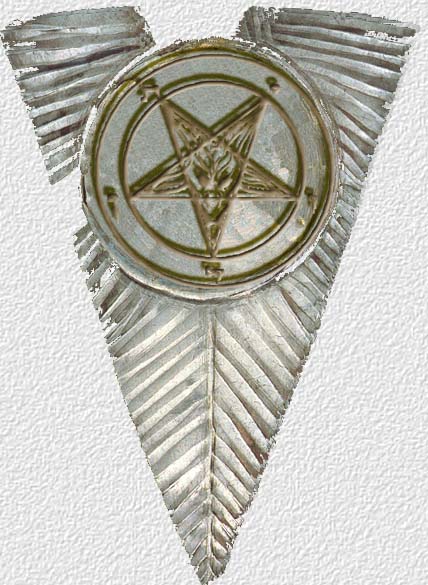
Lesser Magic in Satanism
https://www.dpjs.co.uk/lesser.html
By Vexen Crabtree 2002
1. Introduction to Ritual and Magic in Satanism
“Magic and ritual in Satanism is mostly self-centered, and most of the time is only explicitly concerned with psychological techniques, psychodrama and advanced social skills. Rare communal rituals are more traditional, concerning altered states of mind as a result of the environmental and inspirational aspects of the ritual. Some Satanists do believe, and practice, actual supernatural magic. Such magic is a matter of cause-and-effect and individual willpower, rather than involving any invented external aspects such as demons or spirits. In Satanism, the self is the sole source of power in all magic and ritual.”
"Satanic Ritual and Satanic Magic: 1.1. Magic in Satanism" by Vexen Crabtree (2002)
2. Lesser Magic
“Non-ritual or manipulative magic, sometimes called "LESSER MAGIC", consists of the wile and guile obtained through various devices and contrived situations, which when utilized, can create 'change, in accordance with one's will'.”
"The Satanic Bible"
Anton LaVey (1969)1
Book of Belial: 1
Subtle body language & subconscious communication (i.e., reading 'in between the lines' when a person speaks) are forms of Lesser Magic. Day to day behaviour or specific roles you slip into are forms of lesser magic... the art of controlling people in the most subtle ways. In that much, it isn't a form of supernatural magic, but everyday psychology, even if some develop an uncommon capability in it.
2.1. Curses and Hexes
#cameroon #curses #dominica #magic #Nocebo_Effect #psychology #psychosomosis #supernatural #the_evil_eye
Curses and hexes are forms of Lesser Magic. They are the only profound part of Lesser Magic.
“In communities where they believe in magic and the supernatural, fear of curses and the evil eye can have real psychological effects, sometimes even leading to physical symptoms of illness and malaise2. In the medical world, therefore, the effects fall within the realm of psychosomosis, in particular, the Nocebo Effect. This is an area of neurogenerative disease in which belief and expectation can worsen symptoms3, and within limits, even create symptoms where there's no need for them4.
Although some people believe in curses and intentionally try to enact them upon others - even in the modern world - in most cases those accused of witchery, evil and magic are generally innocent victims, and often already members of disliked minorities or are perceived as an outsider in some way; it is often a case of national development that authorities, scientists and rationalists must convince large numbers of people that it's nonsense before the perceived effects abate.
In face of the evidence of the psyhological nature of curses, believing peoples have had to declare that "Westerners are immune"; for example, the Fang people of Cameroon5 and the Caribs of Dominica6 have both concluded so. But, wrong again - it's not that Westerners are immune - but, that good education7 grants immunity to superstition and makes life more sensible in general, negating the need to explain things in terms of curses and hexes.”
"Curses, Hexes and The Evil Eye: The Psychology Behind Magical Evil" by Vexen Crabtree (2022)
When a neophyte asked me in 2001 how to rid herself of a curse, I told her the best way was not to believe in it. Because when you believe you are 'cursed' you are instantly assuming the worst and actively looking for things to blame on the curse. In that mindset, you are not at your best. If you concentrate on the bad things, that day will seem worse than others. The best approach is to ignore them. I am immune to curses. Shad, a member of the London Satanists, said in 2002 that "the easiest way to 'break' a curse as you put it, is just to not give it any power. By worrying constantly about it and blaming everything that goes wrong in your life on this little thing will only give it more power".
In addition to the psychological effects, LaVey believed that you can indeed effect a more supernatural curse, although he anticipated that some would not share this belief8.
2.2. The 2nd Satanic Sin - Empty Posturing
The 2nd Satanic Sin is "2. Pretentiousness. - - Empty posturing can be most irritating and isn't applying the cardinal rules of Lesser Magic". An example of failure to use lesser magic is empty posturing, where you make yourself out to be something you are not, or cannot provide or do what you claim you can do. This irritating trait seems to be a sign of insecurity, and in most cases in very transparent and will have a negative effect on people's opinion of you. This trait in particular, a Psychic Vampire warning sign, will ensure you never fascinate anyone!
For similar reasons, Anton LaVey wrote that "there is no sorcerer without a sense of humour. A sense of humour confers power in ways that cannot be learned"9. Humour is one of those subtle interpersonal skills that is so essential to enticing people to dropping their guard, that you just can't get along in magic without it. This is best illustrated by thinking of the opposite effect: Nothing puts up someone's defences quicker than if you approach them with pretentious seriousness and a burrowed frown, all dressed in black.